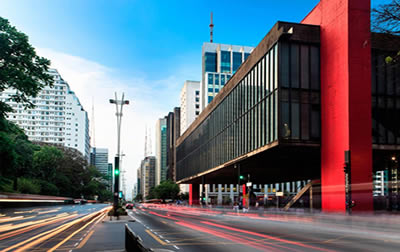
erhaps best-known for its sport and breathtaking scenery, Brazil is home to more than 2,500 universities, with elite institutions including the University of São Paulo, the biggest public university in the country and one of the best in Latin America. Also home to São Paulo State University, Brazil’s largest city and financial capital is also considered the nation’s cultural centre, home to a plethora of museums, art galleries and concert halls – and it has a vibrant nightlife.
Brazil’s 8,000km of coastline include thousands of spectacular beaches. Also unmissable is carnival season, which starts in February. Rio de Janeiro’s carnival is the biggest in the world, with more than two million people lining the streets each day to witness more than 300 bands and samba schools.
Brazil produces a third of the world’s coffee and is renowned for a wide variety of street food. The country’s football team has won the World Cup more than any other nation, and football, by far the most popular sport, has been likened to a religion in the country. But many also like volleyball and, to a slightly lesser extent, mixed martial arts and basketball. Famous Brazilians include footballer Pelé and the late Formula 1 racing driver Ayrton Senna.
Public universities have free tuition for home and international students, but places are limited and most students attend private institutions.
WHY BRAZIL?
Brazil has become a destination for many foreigners, who are looking for an opportunity to learn. In the last seven years, according to data from the Ministry of Foreign Affairs, the number of visas issued to study in Brazil has doubled.
Brazil is a multicultural country, with different dialects, traditions and accents throughout its territory, in addition to being a country the size of a continent, we also have 27 federative units, with very striking diversity and recognized not only nationally, but internationally.
Brazil, from emerging markets, is the most westernized of those that are growing the most.
In addition to having the opportunity to learn the particularities of such a complex language, we are aware of the difficulties faced by foreigners in relation to the Brazilian language, its sounds, expressions, grammar full of exceptions and different accents.
HOW DOES THE SCHOOL YEAR WORK?
In Brazil, the school year of basic education has a minimum duration of 200 days, normally distributed in the months of February to December, with school holidays in July and January. However, the school year does not necessarily have to start and end in the same calendar year. Thus, it can complete the 200 school days in the following calendar year. The school year will have a minimum workload of eight hundred (800) hours distributed over two hundred days in basic education (art. 24 of the LDB)
DIFFERENTIALS:
We have our own basic education college, with more than 30 years of experience in education, recognized by various agencies
Specialized teachers
Tuition
Partners in language schools in the countries where it operates
24-hour monitoring of students
Elite Group Trained Monitors
Base established in Brazil and the United States
Special personalized programs to discover local culture, gastronomy, real experiences
Local guide and food program included
CONTACTS ELITE GROUP:
1(407) 334 8855 (USA) 55(011) 3853 4996 (BRAZIL)


These hobbies round us out as people. They allow us to stretch some creative, competitive muscles while keeping the stakes at a nice.
Take a break from your Jim Rohn collection to read some romance novels without feeling guilty. Write a short story without worrying about whether it’s good.